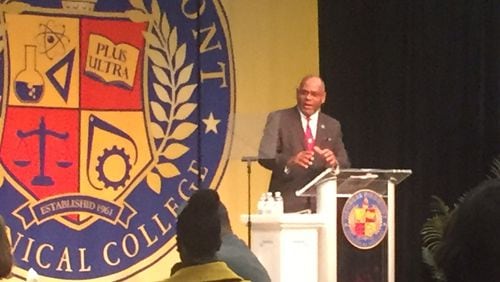The Atlanta Journal-Constitution asked Georgia Piedmont Technical College president Jabari Simama several questions about the college's finances and his impending departure for an article you can read here.
Below are some questions and his written responses. Some of the responses were edited for brevity.
Q: What is your response to Commissioner Arthur’s letter saying the “actions you have taken that have a serious and negative impact on your college, students, faculty and staff” resulted in your resignation?
A: I regret that Commissioner Arthur made this statement because I believe the majority of faculty, staff and students would say just the opposite...I have been a transformational leader in all my professional pursuits. I have never been asked to leave a job, never received anything but the highest performance evaluations including my entire tenure at TCSG. I refused to standby quietly and allow my stellar reputation to be tarnished by Arthur and TCSG. All my performance evaluations at TCSG have been very positive. In fact, last year (July 2018), I got a perfect evaluation, including in the area of fiscal management, and I received a merit increase. GPTC received clean audits each year I have been president.
Q: What is your response to the recent U.S. DOE and state Department of Audits and Accounts reviews of finances at GPTC?
A: As president I take responsibility for all that happens at our college. I was I deeply concerned about the findings and that was why I was working closely with the US DOE office of the Minority Serving and Under Resourced Division, that exists and specializes in providing technical assistance to minority serving higher educational institutions in all areas of financial aid…Once I received the audit reports, I immediately took action by reassigning the leadership of financial aid and appointing an interdepartmental team to tackle the problem. I also developed a partnership with the DOE to focus on both compliance and technical assistance. This team was making tremendous progress and the college was positioned to have the HCM2 issue resolved by June of 2018.
As a practical matter, the Financial Aid Director is 3 levels beneath the president. At GPTC, the financial aid director reports to the associate VP, who reports to an Executive VP. who reports to the President. Colleges generally resolve financial aid issues by changing financial aid directors, not changing presidents who serve as CEO of the entire organization. I placed a lot of confidence in my staff to carry out their duties professionally and correctly and to report problems to me. Unfortunately, in this case this did not always occur. I, on the other hand, kept the Commissioner and his top staff informed of how the college planned to address the findings. We thought we had system office support.
Q: The college’s total reserve fund declined from $4.4 million in FY 2014 to about $700,000 in FY 2017. Why has it declined?
A: First, I built the fund to $4.4 million. Easier then because of growth in enrollment and not raises given. The last two years we were directed to give across the board merit increases and used some reserves for this. We also experienced over the past two years drops in revenue from the bookstore and the economic development division. To address economic development shortfalls, we implemented a RIF and changed department heads. The bookstore losses were being addressed in this year's budget.
Q: How do you feel about your stewardship of the college?
A: My stewardship has been steady. Not only does the performance matrix by TCSG support this conclusion, my appointments to national commissions of the American Association of Community Colleges support this. My prominence in the Center for Digital Education in California support this. As the first black president of the college, I have poured my heart and soul into proudly representing the college and the people of the state with dignity and honor. I have made the college relevant and important to residents of the state, particularly to DeKalb County where 70% of our students reside. I’ve worked hard to be a positive and strong symbol for all students, especially African American students. I have led the college for over 5 years in transforming it from a vocational school to a 21st century technical education college relevant and responsive to the workforce needs of our communities.







